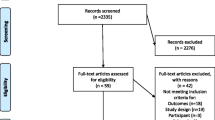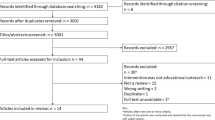Abstract
Continuing education aims at improving practice. In this article, three main research questions are addresssed: Which methodology is optimal to improve counselling behaviour? Are learning outcomes influenced by learning style? Does knowing imply doing? Four educational methods, transferring information on cough medicines, are assessed: a lecture, an interactive workshop, an audiocassette and a textbook. Attendants of the first three methods also received the textbook. Pharmacists completed a learning‐style inventory in addition to a pretest. After the instruction phase, they were interviewed by telephone (post‐test). We also evaluated the counselling behaviour by an 'incognito' visit to participants as well as to controls. Seventy‐eight pharmacists participated. Their learning‐style cannot be related to the results of pre‐or posttest. Each educational method improved the level of knowledge significantly, but none of them proved to be better than the others. The pharmacists who in addition read the textbook, acquired more knowledge than those who did not. Self‐study at home led to more fundamental rather than practical knowledge. Improving knowledge does not result in better counselling: 75% of the pharmacists asked only one question, especially concerning the type of cough. However 9 out of 10 mentioned how to use the drug. About half of the pharmacists told the patient about the action of the medicine. Other items were hardly ever mentioned. There was no difference in counselling behaviour between the intervention group and a group of pharmacists who did not attend the course. This investigation does not reveal any particular method of in‐service training as being more efficient. Active use of self‐study materials helps to improve pharmacological knowledge. Implementing educational strategies to improve counselling behaviour remains a future aim.
Similar content being viewed by others
References
Leemans L. Information seeking behaviour of the pharmacist and his rationality in the delivering of OTC products. Doctoral thesis K.U.Leuven, 1996: 196.
Kolb DA. Experiential learning: experience as the source of learning and development. Englewood Cliffs, New Jersey: Prentice-Hall Inc., 1984:61–96.
Dousma T, Horsten A. Onderwijskundige informatie voor het hoger onderwijs: tentamineren. [Pedagogical information for undergraduate education: tentaminating.] Utrecht/Antwerpen: Aula/Uitgeverij Het Spectrum, 1985:96.
Murray TS, Dyker GS, Campbell LM. A characteristics of general practitioners who did not claim the first postgraduate education allowance. BMJ 1991;302:1377.
Dandurand K. Pharmacists' information sources. Am Pharm 1994; NS34(11):4.
Batz FR, Fisher WC, Jones WN. Attitudes among department of veterans affairs pharmacists towards postgraduate education and training. JHP 1991;48:732–5.
Pitts J, Vincent S. A general practitioners' reason for not attending a higher professional education course. Brit J Gen Pract 1994;44:271–3.
Rankin JA. Problem based medical education: effect on library use. Bull Med Libr Assoc 1992;80:36–43.
Shin JH, Haynes RB, Johnston ME. Effect of problem-based self-directed undergraduate education on life-long learning. Can Med Assoc J 1993;148: 969–76.
Hoyle SM et al. A study into how community pharmacists update their pharmaceutical knowledge. Pharm J 1990;245:E8–E9.
Mottram DR. Analysis and evaluation of postgraduate continuing education for community pharmacists. Pharm J 1991;47:537–9.
Rutz W, von Knorring l, Walinder J. Long-term effects of an educational program for general practitioners given by the Swedish committee for the prevention and treatment of depression. Acta Psychiatr Scand 1992;85:83–8.
Cook H. Task based learning-the results of a pilot study. Pharm J 1993;251:93–5.
Archer J. Continuing competence: accomodating different learning styles. Handout for workshop, Conference on Life Long Learning in Pharmacy, Madison (USA) 22-26 August 1994.
Lipton HL et al. Pharmacists as agents of change for rational drug therapy. Intl J Technology Assessment in Health Care 1995;11(13):485–508.
Claesson C, Fryklof LE. The professional role of the pharmacist; a socio-vocational investigation (2). JSAP 1983;1(3): 149–57.
Munroe WP, Rosenthal TG. Implementing pharmaceutical care: evolution and revolution. Am Pharm 1994;NS34(4):57–67.
Hepler CHD, Strand LM. Opportunities and responsibilities in pharmaceutical care. Am J Hosp Pharm 1990;47:533–43.
Cancrinus-Matthijsse A. The contence of professional practice. From dissertation: The professional and commerical dimension: differences in professional practice and task conceptions of community pharmacists in a number of Western European countries. Amsterdam: ICS, 1995:119–203.
Erwin J, Britten N, Jones R. General practitioners' views on over the counter sales by community pharmacists. BMJ 1996;314:617–8.
Kennedy J. Over the counter drugs: changing the roles of doctors and pharmacists. BMJ 1996;312:593–4.
Hollis-Triantafillou J. Over the counter antibiotics. BMJ 1996;312: 644.
Blenkinsopp A, Bradley C. Patients, society, and the increase in self medication. BMJ 1996;312:629–32.
Thomas D, Noyce P. The interface between self medication and the NHS. BMJ 1996;312:688–91.
Campagna MA, Berger BA. Using Blooms' taxonomy to assess pharmacists' learning as a result of viewing a program on communication skills. Am J Pharm Educ 1990;54:7–14.
Bruskiewitz RH, Boh LE, De Muth JE. Evaluation of teleconferencing for continuing pharmaceutical education: satisfaction, knowledge and application. J Cont Educ Health Prof 1988;8:41–54.
Boh LE, Pitterle ME, De Muth JE. Evaluation of an integrated audio cassette and computer based patient simulation learning program. Am J Pharm Educ 1990;54:15–22.
Kamolratanakul P. The influence of dissemination of information on the changes of knowledge, attitude and acceptance of hepatitis B vaccination among hospital personnel in Chulalonkorn Hospital. Publ Health 1994;108:49–53.
Self TH et al. Nurses performance of inhalation Technique with metered-dose inhaler plus spacer device. Ann Pharmacother 1993;27:185–7.
Ekedahl et al. Drug prescription attitudes and behaviour of general practitioners. Effects of a problem-oriented educational programme. Eur J Clin Pharmacol 1995;47:381–7.
Smith DK et al. Training obstetricians and midwives to present screening tests: evaluation of two brief interventions. Prenatal Diagn 1995;15:317–24.
Peterson GM, Sugden JE. Educational program to improve the dosage prescribing of allopurinol. Med J Austr 1995;162: 74–7.
Avorn J, Soumerai SB. Improving drug-therapy decisions through educational out-reach. A randomized controlled trial of academically based detailing. New Engl J Med 1983;308:1457–63.
Milton A. Doctors and pharmacists-Siamese twins. Int Pharm J 1997;11(3):62–3.
Sutters CA, Nathan A. The community pharmacist's extended role: GP's and pharmacists' attitudes towards collaboration. J S A P 1993;10: 70–84.
Author information
Authors and Affiliations
Rights and permissions
About this article
Cite this article
Leemans, L., Laekeman, G. Teaching and counselling behaviour: an applied study with community pharmacists.. Pharm World Sci 20, 238–247 (1998). https://doi.org/10.1023/A:1008660920419
Issue Date:
DOI: https://doi.org/10.1023/A:1008660920419




